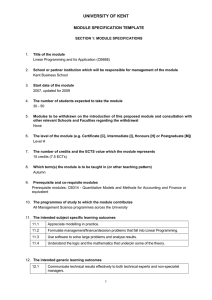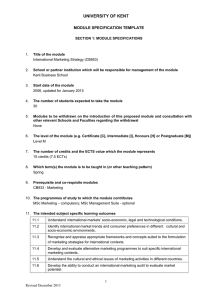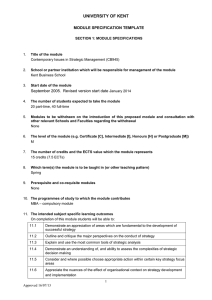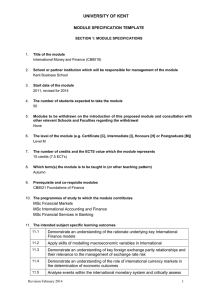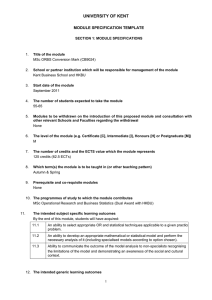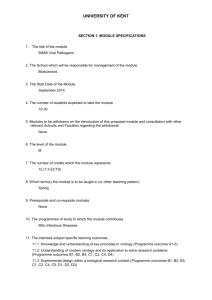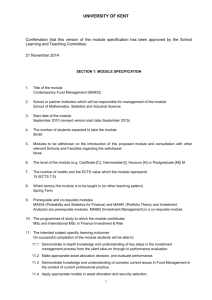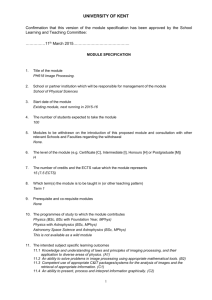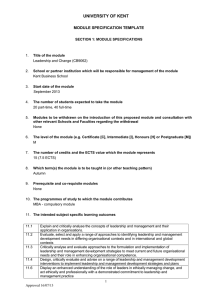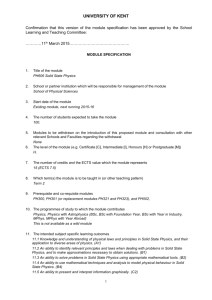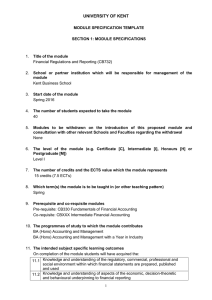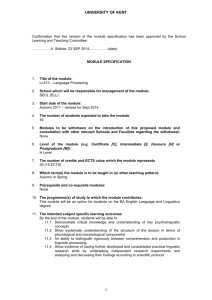New Product Development and Innovation
advertisement
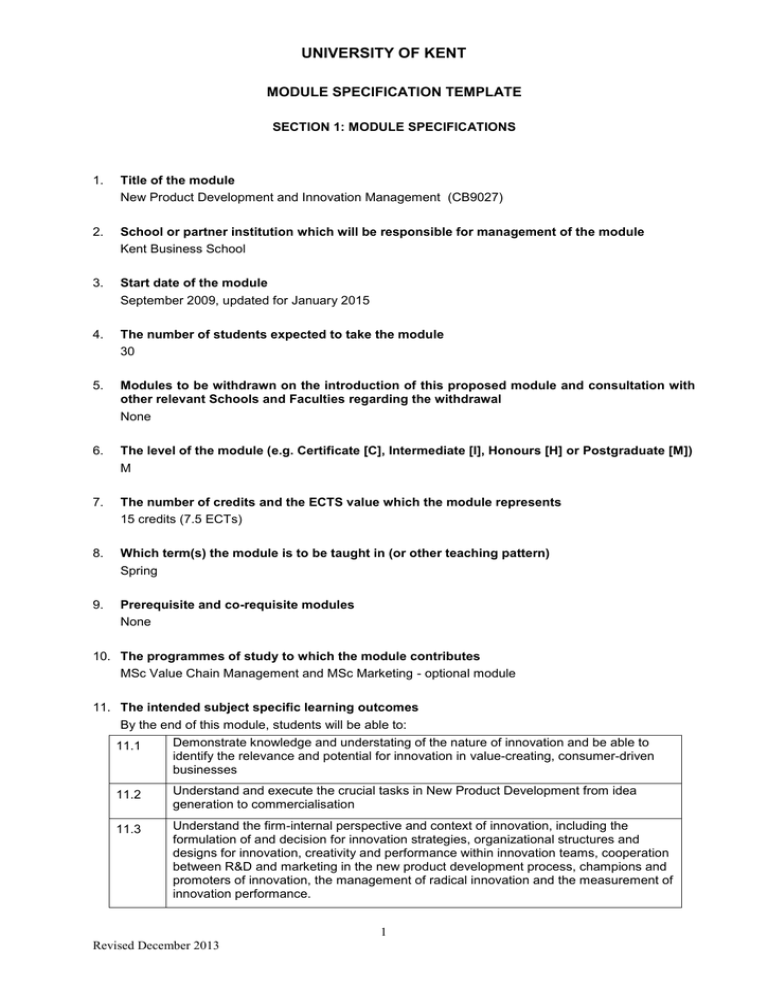
UNIVERSITY OF KENT MODULE SPECIFICATION TEMPLATE SECTION 1: MODULE SPECIFICATIONS 1. Title of the module New Product Development and Innovation Management (CB9027) 2. School or partner institution which will be responsible for management of the module Kent Business School 3. Start date of the module September 2009, updated for January 2015 4. The number of students expected to take the module 30 5. Modules to be withdrawn on the introduction of this proposed module and consultation with other relevant Schools and Faculties regarding the withdrawal None 6. The level of the module (e.g. Certificate [C], Intermediate [I], Honours [H] or Postgraduate [M]) M 7. The number of credits and the ECTS value which the module represents 15 credits (7.5 ECTs) 8. Which term(s) the module is to be taught in (or other teaching pattern) Spring 9. Prerequisite and co-requisite modules None 10. The programmes of study to which the module contributes MSc Value Chain Management and MSc Marketing - optional module 11. The intended subject specific learning outcomes By the end of this module, students will be able to: 11.1 Demonstrate knowledge and understating of the nature of innovation and be able to identify the relevance and potential for innovation in value-creating, consumer-driven businesses 11.2 Understand and execute the crucial tasks in New Product Development from idea generation to commercialisation 11.3 Understand the firm-internal perspective and context of innovation, including the formulation of and decision for innovation strategies, organizational structures and designs for innovation, creativity and performance within innovation teams, cooperation between R&D and marketing in the new product development process, champions and promoters of innovation, the management of radical innovation and the measurement of innovation performance. 1 Revised December 2013 UNIVERSITY OF KENT 11.4 Apply appropriate (qualitative and quantitative) data analysis techniques to critically evaluate business’ innovation performance and generate ideas for improving innovation performance 11.5 Demonstrate critical awareness of the key tools and techniques for mapping innovation, where to find information on leading edge approaches and have the ability to critically evaluate, select and systematically apply these in actual business situations 12. The intended generic learning outcomes By the end of this module, students will be able to: 12.1 Reflect on their own skills, knowledge and practice, and to ensure their own continuing self-development 12.2 Develop interpersonal, communication, and team-working skills. 12.3 Develop research, analytical, evaluative and critical thinking skills. 13. A synopsis of the curriculum Innovation Management (e.g. innovation typologies / degrees of innovation, models of innovation and innovation management) Innovation Systems (e.g. people, leadership and organisation structures for innovation) Innovation Performance (e.g. determining how innovative an organization is) New Product Development (e.g. how to define and quickly implement concepts for new products, services and process) 14. Indicative Reading List The core text for this course is Trott, P. 2012. Innovation Management and New Product Development, 5th Edition, London: Financial Times Prentice Hall (ISBN-13: 9780273736561). Tidd, J. and Bessant, J. 2013. Managing Innovation: Integrating Technological, Market and Organizational Change, 5th Edition. London: John Wiley & Sons Ltd (ISBN: 978-1-118-36063-7) Supplementary text Cagan, J. and Vogel, C.V. 2001. Creating Breakthrough Products. London: Financial Times Prentice Hall. (ISBN-13: 9780139696947) Scientific Journals: Journal of Product Innovation Management Technovation R&D Management International Journal of Innovation management Creativity and Innovation Management 15. Learning and Teaching Methods, including the nature and number of contact hours and the total study hours which will be expected of students, and how these relate to achievement of the intended module learning outcomes: Hours Subject LOs Generic LOs Lectures 12 11.1-11.5 12.3 Seminars 12 11.1-11.5 12.1-12.3 Independent study 126 11.1-11.5 12.1-12.3 Total hours 150 2 Revised December 2013 UNIVERSITY OF KENT 16. Assessment methods and how these relate to testing achievement of the intended module learning outcomes Weighting Subject LOs Generic LOs Examination – 2 hour unseen 60% 11.1-11.5 12.1, 12.3 Group written report – 3000 words 40% 11.1-11.5 12.1-12.3 Assessment will be by examination and course work. Coursework will consist of a group written report (3,000 words) involving the development of an innovation strategy for the introduction in the market of a new product/service concept of the students’ choice. The group project will make up 40% of the final mark. For the group report, students will submit an individual reflective account of their individual contribution to the group assessment together with comments on how well the group performed as a whole. 17. Implications for learning resources, including staff, library, IT and space None 18. The School recognises and has embedded the expectations of current disability equality legislation, and supports students with a declared disability or special educational need in its teaching. Within this module we will make reasonable adjustments wherever necessary, including additional or substitute materials, teaching modes or assessment methods for students who have declared and discussed their learning support needs. Arrangements for students with declared disabilities will be made on an individual basis, in consultation with the University’s disability/dyslexia support service, and specialist support will be provided where needed. 19. Campus(es) where module will be delivered: Canterbury and Medway SECTION 2: MODULE IS PART OF A PROGRAMME OF STUDY IN A UNIVERSITY SCHOOL Statement by the School Director of Graduate Studies: "I confirm I have been consulted on the above module proposal and have given advice on the correct procedures and required content of module proposals" ................................................................ .............................................. Director of Graduate Studies Date ………………………………………………… Print Name Statement by the Head of School: "I confirm that the School has approved the introduction of the module and, where the module is proposed by School staff, will be responsible for its resourcing" ................................................................. .............................................. Head of School Date ……………………………………………………. Print Name Module Specification Template Last updated February 2013 3 Revised December 2013
